The 2019 Analysis of SEO for Higher Education Marketing

An Actionable Guide to SEO for Higher Education Marketing
Our updated 2020 Analysis for Higher Education SEO is located here.
Hey WooNation! Ready for some SEO for Higher Education insights?
Today marks an epic event here at our coffee infused global think tank, and you get to enjoy every last delicious drop from it.
The news? We decided to set out and do a new series about
What It Takes To Rank In X Industry Right Now
Within this series, we are doing an updated rolling analysis across several niche industries and digging into what it takes to rank in those specific industries at this very moment in time.
We are jumping into our massive datasets to pick out the top ranking factors we find for how certain sites rank in specific industries and providing all the juicy goodness to you.
We will also glean some insights when blending all these findings to see what is changing as a whole in the SEO space when it comes to SERPs and ranking signals in general.
So why did we decide to do this?
Well, because we can!
When I dreamed up the first vision for what later became SERPWoo over eight years ago, I wanted something to give me an edge as a digital marketer.
I wasn't happy with knowing my rank in the top 100 or relying on some fake guru to tell me what they "thought" was going on. I wanted to dig into hardcore data, test my crazy ideas, and then dominate the SERP results with my findings. I also wanted to act on current data, not something that was valid months or years ago.

That spirit still lives on to this very day in everything we do at SERPWoo.
It's not enough to get 1 level up and settle down. We want to push the edge and dominate it every day so that our competitors in the SERPs have no chance at all.
As someone that builds sites like you, I have a real vested interest in making SERPWoo more powerful every year. Sharing our data in this new series helps me refine our product and ensure the mission of "having an edge as a digital marketer."
And because I spent years as a highly sought after digital marketing consultant for over 50+ colleges and universities in the Higher Education space, I decided to do our first publication on
2019 SEO Findings For Higher Education Marketing - What It Takes To Rank
I took my time to hone in on over 700+ variables that could help in ranking a website for keywords in this industry.
And we didn't pick one keyword to do this analysis; I researched many unique and cookie-cutter keyword phrases that span results from private faith-based schools, to state-sponsored and Ivy League universities.
We scanned ground and online programs. We pulled data for Associates to Masters programs. I wanted to make sure the data was comprehensive and full.
In the end, we pulled all the data together in Excel sheets and poured hours into looking at what variables correlated with page 1 SEO rankings for every keyword we tested. By looking at what was happening on page 1 ( and sometimes page 2 and 3 ) compared to the rest of the SERPs and correlating those results, I could get an understanding of what was working and what was important per keyword we tested.
That's great on a keyword level.
But no real college or university relies on one keyword.
So I took all the keyword level data I had analyzed and looked at the industry as a whole by aggregating the results, taking out a few outliers, and assembling the data as an industry composite.
What I found verifies some things we already know about SEO in general, but also shows some surprising results that many might not have thought about before.
And before anyone complains, I am not sharing the keywords we tested.
Too many people complain about getting "outed." If you are in the Higher Education space, then you already know about terms like:
- Criminal Justice Degree Online
- BA in Communication Studies
- Masters of Business Administration Program
- RN to BSN Online No Clinical
- Universities with Exercise Science Degrees
- Associates Degree in Elementary Education
- Affordable Liberal Arts Colleges
- Etc, etc, etc
So while I am not going to out the entire list of specific keyword phrases we used in the analysis, you can pretty much tell from the above what we researched. Add a lot more keywords to the list, and you get the gist if you use your brain.
See, no outing from me you affiliate and lead gen aggregator haters. Stop with it already.
Now, what exactly did we find?
In a nutshell, more links and more content ranks sites on page 1 ( generally ).
That wraps up this edition of our series, thanks and see you again next week!
Scary right? That's what most articles and blog series do for you.
Not SERPWoo. Nope. Not Today.
What we found was it's not so much more links and more content, but how that "more content" and "more links" stuff is used and broke down. And it's specific to the Higher Education vertical.
We now share our aggregated results with you below.
NoFollow Backlinks Correlate With First Page Rankings
Remember when nofollows weren't supposed to help with rankings?
Our findings show that page one URLs have more nofollow backlinks than page 2-10 URLs.
And while some might scream this is an example of page 1 URLs having more total backlinks overall, and thus some of those will be nofollows.. it doesn't account for the fact that URLs on page 3 who have a similar number of total backlinks ( but very few nofollow ) aren't on page 1.
If total backlinks for page 1 URLs and page 3 URLs are similar, but nofollows are less on page 3 and more on page 1 URLs, then you have to give the credit that nofollows ARE helping in rankings.
The research also confirms our findings earlier last year where we tested and found that Quora helped our website rank in the SERPs, and almost all those backlinks are, wait for it… nofollow. You can catch that breaking case study here.
Below are the results, averaged for each page result.

I can hear a lot of you asking, "What about page 4 results; those are similar to page 1?"
I never said these were silver bullets. That nofollows alone will rank your site on page 1.
Like an onion with layers ( ref. Shrek ), this is one of several variables and factors layered together like a wedding cake.
So while their nofollows might be the same as page 1, the whole layered wedding cake ( SEO strategy ) isn't as delicious...
When I dig into other variables for page 4 rankings, I find those sites have fewer backlinks, less content, and less of many other factors. But when I look at page 3 variables, the total backlinks, content, and other factors are like page 1.
The most significant differences between page 3 and page 1 variables? Well, one of those differences is the nofollow average presented above.
By using some math for a correlation efficient and looking to get at least 90% significance, we can say that nofollows are a factor when looking at page 1 compared to pages 2-10.
And it makes sense too that nofollows WOULD be a factor.

I mean, what self-deserving spammy blackhat SEO spends their money on links we were all told hold no value? When was the last time you saw a link seller on Fiverr cashing out on nofollow links?
The abuse is in having links that are dofollow and hold a TF or DA ( insert your own metric here ) of high value.
That's what all the spammers and blackhats buy, right? It's what everyone is selling to the masses. Wouldn't make sense then that a site profile that contains nofollows would LOOK more natural and honest?
If that isn't enough, we did do that Quora case study ( see link above ) where we gained nofollow links and raised our rankings to the first page of Google for our keyword.
And to help out, maybe that's why a school like Lindsey Wilson College is on page 5 for a significant nursing keyword. They have 0 nofollow links for the page that is ranking on the 5th SERP result.
Well, SERPWoo is here to help. Here you go Lindsey EDU, a fresh nofollow backlink to help out your SEO strategy.
But the magic doesn't stop there. Oh no.
Nofollow links also help you, if you are linking out. Below are the results, averaged for each page result.

And why shouldn't they help you when you link out?
An authoritative and helpful website is going to link out to other resources to provide the end user great content. At some point, you're going to use nofollow to "ahem", protect your link juice.
Surprisingly, we tracked dofollow links too in the same fashion ( outbound ) and those didn't correlate to page 1 rankings. It didn't even come close to making the list.
No matter how you pack it, nofollow links are super helpful in the Higher Education industry for ranking on the first page.
Summary:
Nofollow links, at the time of this writing, are a supporting factor in ranking URLs on the first page of Google based on not only correlation with statistical relevance, but also with a prior case study we did here at SERPWoo in 2017.
Use nofollow links both when linking out and obtaining links back to your URL.
Target Keywords In The First 100 Words Of Text
Telling people your keywords upfront ( and letting the GoogleBot know too ) shows to correlate with first page rankings.

Now, this is where we can get fancy with our HTML and CSS.
Many sites stuff the top of their page with navigational menus ( both in browser view and source code view ) and plenty of other useful things, but how about presenting your target keywords first in the source code and loading the menus later within your source code?
Most menus and other header code contain text. Text that could be counted ( depending on how you code ) as the first 100 words of text for your page.
So instead of presenting most of the header info first in your source code, offer something that could be useful for Google and be picked up to help you rank.
Here's a lousy example that is some of the first text of a URL ranking on the 6th page of Google that is loading some generic navigation:

Now here's a current GOOD example that is some of the first text of a URL ranking on the 1st page of Google:

We redacted some of the text to not "out" this well-ranking URL.
Even though both are examples of navigation, you can see the 2nd example is a far better use of getting target terms to the top of the page to be considered some of the first 100 words on the page.
But you can take this further and push your actual copy ( p or div tags, etc ) right after the body tag, leaving any boring header copy ( navigation menus ) at the bottom of your source code. Have your CSS restructure the page on page load and all will display fine.
This may be a tactic that a university such as Ohio.edu could use to move from 61st rank to the 1st or 2nd page of Google for a term like "child psychology degree online". Again, this isn't a magic bullet, but an extra layer built into the SEO strategy that could help them rank better.
Of note, it isn't about getting the term in the first 100 words of text. It's about the frequency of the target terms in the first 100 words of text of the page too.
So if your terms are centered around "child psychology degree online," how many times are those terms showing up in the first 100 words?
Summary:
Look over your target terms per page and align them to where they are the first words of the page. Move or change header elements ( like navigation, breadcrumbs, etc. ) if need be.
Focus on frequency, not just getting the target term/phrase in the first 100 words one time.
Having A Lead Gen Form Helps Rankings In Many Ways
Higher education is a mostly lead gen based industry when it comes to digital marketing.
As so, it makes sense to have a form on your URL to collect leads that might later turn into applications and enrollments.
Yet, it is widespread for schools to rank pages that do not have a form. Instead, these schools opt to have the user click another link on the ranking page to fill out a form, download a catalog, or "do more."
The University Of Central Florida is a perfect example of this harmful practice. Take note of their Masters of Science in Criminal Justice page that ranks on the 3rd page of Google.
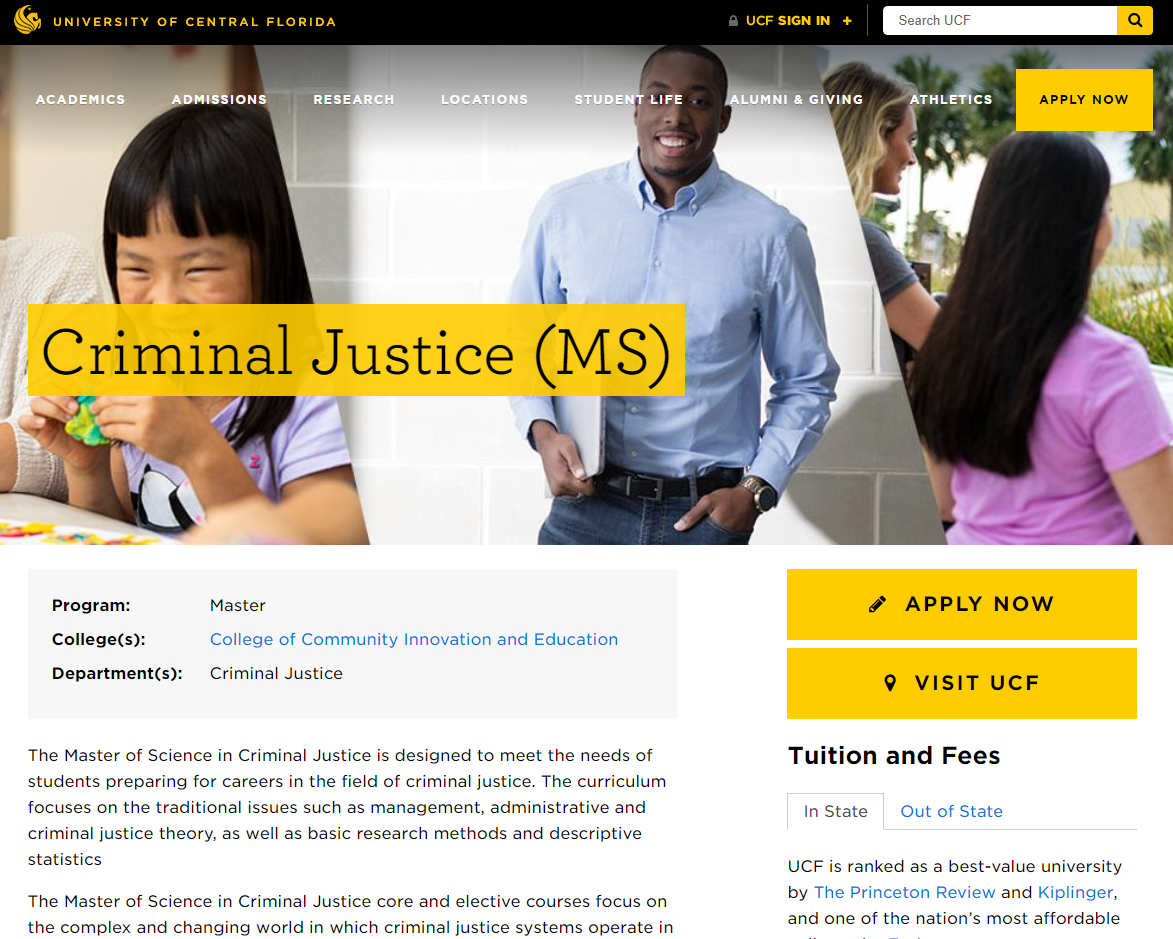
We shouldn't have to make users think about what to do next. Put the form up UCF!
When we dig into the data, here is what having a form does for rankings.

Ugh, doesn't look very exciting, does it?
From looking at this, you can tell that there isn't much difference in having a lead form than not having a lead form, right? It appears that almost everyone has a form and the numbers are the same across the board. There is only a slight edge for page 1-3 rankings.
The averages are not that different per page rank especially when you think of UCF and the fact they are on the 3rd page for the term we tested.
But we do have a higher average for page 1, 2, and 3 compared to the rest of the SERPs.
Here is what I am thinking though… it's not the "having" of a lead form that helps in rankings. It's what a form can provide you that helps with the ranking.
Confused?
Well, we kept digging into the data, and a form helps you with other correlations such as getting your target keyword in Label tags. Check out the data below.
Keywords in Label tags:

Keywords in Option tags:

Keywords in LI tags:

Fascinating, right?
And yes, I can think of times when you can use these HTML elements without a form, but we all know that historically these tags are used WITH forms.
Yes, I know they are used for breadcrumbs, lists, navigational menus, etc.
However, seeing that the Label tag makes a correlation for ranking, I can't help but think that Option and LI tags are strongly associated with it. You're mainly using Label tags within form elements.
A case could be made that having a lead form combined with a list ( possibly outlining jobs with the degree ) would be something to test. Or measuring having a form against having a list ( with an apply now button ).
Could be something we look for in a second test later this year.
Best case, have a form on your URL combined with a list.
-- Edit
I realized I forgot to add a critical piece to this, the Legend tag. It's not very often developers use the Legend tag outside of a form.

Interesting, and it helps further push that having a lead form helps.
Summary:
Don't make users click to a second page to fill out a lead form.
Use your form as an opportunity to insert more copy of your target keywords within your page that you want to rank, paying attention to:
- Label tags
- Option tags
- LI tags
- Legend tags
The Title Tag Is Still All Important, But With A Twist
Anyone in the SEO industry knows how important your Title tag is. I shouldn't have to explain why in a report such as this.
But I see a twist with SERP rankings in general that play out in the Higher Education industry.
Anyone that does copy in Higher Education knows how picky and finicky the whole industry is. One misrepresentation could cost a school its accreditation.
And that's some serious stuff.
Because of this, and the attitude of academia overall, the Higher Education industry tends to shy away from sales-y copy and anything to do with sentiment by large.
This is where aggregators and lead gen companies have come in and preyed on the algorithm over real colleges and universities. Academia's shyness over sentiment and sales has cost them rankings that non-academic organizations are dominating in.
Let's take a look at some data we pulled on the Title tag itself.

So what are sales words you ask? They would be terms like cheap, best, top, etc.
When you hone in, affiliates and aggregators have come in where traditional academia tends to stay away.
Being able to stuff your title with phrases like "The Top Cheapest Bachelor's Of Science Degrees in Sports Management for 2019" is helping those that can pull it off.
Most schools will not be able to stuff sales terms in their Title tag, but I see no reason why they could not experiment with adding in the year. We all know that most programs run on a continuous cycle during the year ( for enrollment starts ), so why not add in the year that students would be starting into the Title tag?
A school like the University of Louisville ( right in my own backyard, Go Cards! ) which sits 32nd for the Sports Management/Administration term we tested could benefit from changing their title from, "Bachelor of Science in Sport Administration — University of Louisville Online Learning" to "A Top Rated and Affordable 2019 Online Bachelor of Science in Sport Administration"
Something to think about the next time you look at making edits to your title tags.
Summary:
Paying attention to the SERPs and capitalizing on weak areas is what is helping non-academic organizations rank ahead of schools for multiple keywords. As a side benefit, many times web surfers get intrigued to find out what are the "Best Masters Degree In 2019 For Criminal Justice majors" and click based out of interest.
This tactic wins a visitor to their site, and you get left with no visitor.
Not capitalizing on this trend could hurt universities and colleges until Google decides to change their algorithm to reflect this, which may never happen.
Currently, many schools may want to add in the start year for their program and also try subtle use of sales terms like "affordable" or "ranked best". Many schools use the U.S. News badges on their sites, so why not use those "awards" in the title of your page too?
More Content And More Keywords Still Dominates The Front Page
When I first dug into the data, I was excited to pull up stats like this below.

I mean, wow!
Stuff some keywords in a few tags and expand out my sentence count and I'm popping champagne and riding in limos eating shrimp cocktails all day playa!
I'll be high fiving my managers and looking like the MVP of the marketing department for sure.
Yet, it's never as simple as that.
You have to examine the data and triple check what you are pulling out of it.
Like anything, you also have to step back and look at the bigger picture when you factor in other variables pulled.

Now it becomes clear; it's not about the sentence count itself or keywords in the form tag alone, it's all about more content in general.
The first page is dominated by pages that are:
- More significant in size ( kilobytes ) - most likely from the fact more content is on those pages ( look at Count of Words )
- More content allows more keyword phrases in your content. Having more of your keywords in the content is showing up as a ranking variable.
- Different mixes of content are helping as images are showing up as a ranking variable.
- More content will impact your sentence count and your P and Div tag counts, which is why those are showing up as having more = a first-page ranking variable.
- While it is about more content in general, paying attention to certain variables like the Form tag having keywords in them shows us again that having a form does have benefits ( see our section above about "Having A Lead Gen Form Helps Rankings In Many Ways" )
We pulled A LOT more variables than what is listed here. Some of the things were "blah," and others were very interesting. But, looking at the larger picture again, it came down to pages having more content are ranking better than pages with less content.
And that content included using the target keywords more within that content.
It also includes different types of content such as images and video.
We are still watching many of these variables in future updates to this article, but right now it's safe to tell you that more content and more use of your target keywords are driving rankings.
This is the reason we see schools like CNU.edu getting ranked 42nd for their elementary education degree offering. There is no copy at all on the page.
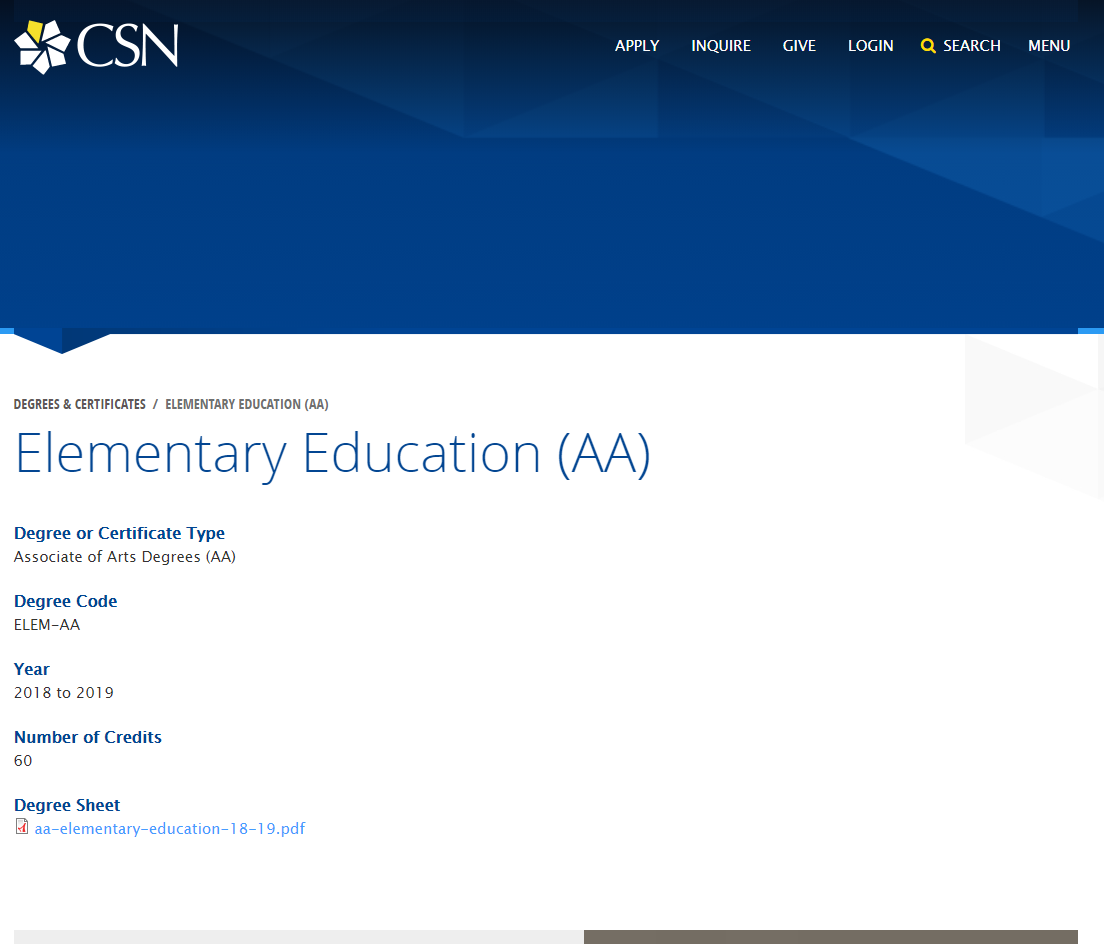
One element I wasn't going to share here ( but I decided I would ) was that I found keywords in the script tag an exciting discovery.

As I investigated the sites that ranked well for this variable, I found heavy use of inline Javascript that seemed to interact with forms of some kind. Often these forms contained elements that included the target keywords.
Think of Javascript that powers a lead form, and it's dropdowns have the keywords in it, like a selection of degree programs or options for that degree program.
Is this a case where more content and more keywords rank sites?
Could this be used as a case of keyword stuffing coming back from the dead again?
We do have one outlier on page 9 rankings. Again, not a silver bullet for this variable but more of a layered strategy where other factors are contributing to the page 9 results being on page 9.
I'll let you sit on the Javascript use and decide.
More content and more keyword use, no matter how you get it in, seems to dominate the front page at this moment.
Summary:
Real estate professionals hammer in the mantra "location, location, location".
Search marketers in Higher Education need to hammer in "content, content, content" with a sprinkling of inserting their target keywords in as many areas as possible ( be smart with this, don't spam or overdo it ) over and over again.
Getting your target keywords in as many different HTML tags/elements and creating more content is winning the game right now in the SERPs for the Higher EDU crowd.
You should be matching and exceeding what your competitors are doing if you want to have a shot at first page rankings.
Domain Age, It's Important No Matter How You Slice It
In our article about domain age from 2017, we pointed out that domains less than one-year-old were not ranking unless a few special circumstances presented themselves.
We find this still plays out in 2019 for the Higher Education industry.
Out of the thousands of URLs we collected, only one domain ever ranked for the front page of Google that was less than a full 12 months old. However, I must point out it was a couple of days away from a full 12 months.
And that domain was an EDU domain.
Besides that one domain, all the front page rankings went to domains that were at least 3 years old.
The reason we keep bringing this up is, there are plenty of smart and good digital marketers out there that can get great content up very quickly once they buy a domain. They also have the resources ( from prior website projects ) to obtain lots of high quality and relevant links in a few weeks.

So why aren't these marketers slapping up sites and ranking them first page for difficult niches in a few months?
Because age/time matters. We pointed this out in 2017.
Weithers its domain age, the age of backlinks, the age of the trend of your link profile, the age of your content ( new, old, or updated ), etc. The fact remains that age/time matters.
And since the links and content live and connect to your URLs and domain, we lump this as domain age.
Simply put, no one is ranking brand new domains on the first page for "real" keywords. Not even SEO's that have access to thousands of dollars for great content, social media, and relevant high authority backlinks and mentions.
Maybe the trust still has to be built up. Perhaps a trend has to be established.
No matter what, without the passage of time ( thus age ), the domains are not ranking until some age is acquired.
And let's not bring up that Google's own John Mueller said "no" when asked if domain age matters when it comes to rankings because he's also the guy that said, "SEO's don't manipulate Google, they manipulate websites."
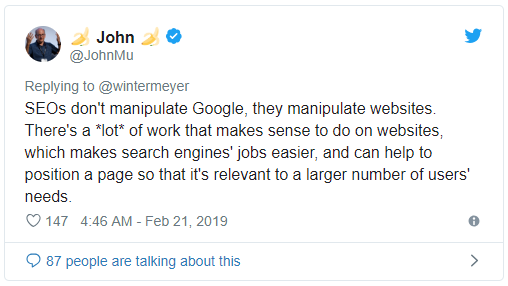
Advice from Google seems like a lot of "spinning" if you ask me.
I'd be taking any advice from Google with a grain of salt because I have seen plenty of double talking over the 20+ years I have been in the digital marketing space.
Also, his "no" comment about domain age being a factor was from 2017. Who's to say things haven't changed in almost two years? The Google ranking algorithm isn't static and unable to change, right?
Summary:
If you're handling a web project where the domain is new, you need to take into account that ranking on the first page of Google might take a full 1 to 3 years to play out.
Make sure upper management is informed and expects this, and that the project budget reflects such a timeline.
Not only does our 2017 study reflect this, but our current analysis of the Higher Education industry is also confirming our findings.
Links Are Still A Foundation Of SEO For Higher Education
While many people still think more is better, it's more about the type and quality of links. It's more than the sheer number of links.
It also has to do with the anchors of those links too, as we found further below.
Meet SEO super smart giant Grindstone. He's a superpower user of SERPWoo for many years now.
SERPWoo helped him sort out some interesting data when it was time to look at what kind of backlinks help sites rank on the first page of Google.
While his case study wasn't on Higher Education ( we will hit those in a moment ), it did reflect the same kind of multiple niche and multiple site approach we here at SERPWoo did for this report.
Here are his findings, wrapped up as a Twitter storm.
I'll save you some time and break it down as "High Authority Domain Relevant" links are winning the front page of Google. I bet no one is surprised by that.
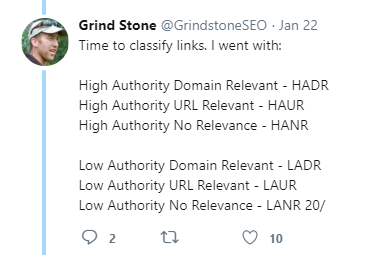
Links from high authority sites that are also links within your industry ( which makes them relevant to you ). That's always been a holy grail for SEOs.
However, it is nice to get this confirmation still. It's also nice that Grindstone further breaks down the next set of importance in link building, which came in as:
- High Authority URL Relevant
- Low Authority Domain Relevant
- There are more classifications, but instead of posting here, read his Twitter storm above for more context.
So do you see a pattern?
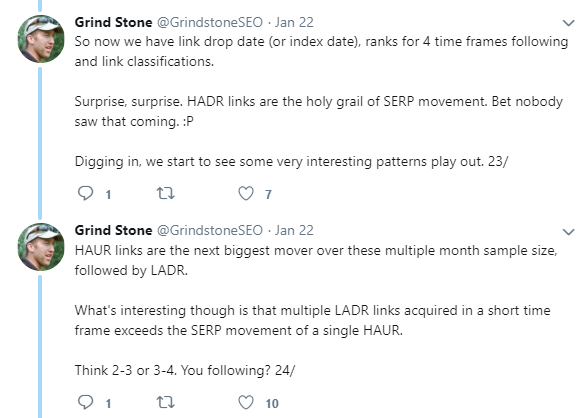
Domain relevance is more potent than URL relevance. Even if from a low authority site.
It's so powerful that a Low Authority Domain Relevant link overshadows a High Authority Non Relevant link.
Obtaining links needs to be 100% focused on relevance, even if its a low authority source because Grindstone's findings show that a Low Authority Domain Relevant link is better at moving the needle than a High Authority Non Relevant link.
But what was interesting was that Grindstone was kind enough also to let us know that almost all the anchors for these sites ranking on the first page were anchors that included the brand name in the text. Either the anchor was a brand name alone, or it contained a partial keyword/phrase match.
Almost no one was using exact match keyword anchors, or better put, they aren't building ANY anchors that match the terms they're ranking for.
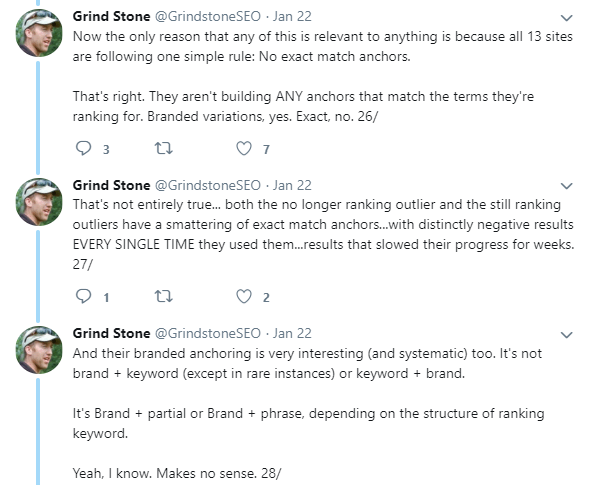
Surprised?
That leaves us with the thought that lots of content with targeted keywords on your page, with brand anchored links ( or brand with partial keyword/phrase ) from domain relevant sites ( sites within your topical niche ) is the high-level strategy that your organization should be focusing on.
Anything else, well doesn't move the needle from all the data that's collected.
So where does that leave us when it comes to Higher Education specific link data?
Let's dig into what we found here at SERPWoo.
Of note, we are still very early in our research, but we did dig up some things we knew, and some things we didn't.
As a reminder, none of these are magic bullets on their own.

Keeping in mind these are averages from many keywords; we can see that more links tend to be a good thing. However, the quality would need to be researched later as well as several other factors like the age of the links, velocity of how the links were obtained, etc.
While known by experienced SEOs, it was good to see image backlinks and external backlinks are playing a factor in ranking for the first page.
It goes to show that linking out to more information in general ( nofollow anybody? ) and that links from different sources like images ( infographics possibly ) are helping with rankings.
We see a page 6 outlier for the image backlinks, but after further review, it looks like this could be either a penalty or other factors causing the results to hang back on page 6.
This could help schools like Los Angeles Pacific University, who have a ranking for their URL on page 3 for a Liberal Arts program, rank on the first page if they add some external links to their URL. They may also want to focus on adding in a form too so they can capture more leads and score a better ranking.
We also find that EDU backlinks are helping as well.
Digging in, we find that most aggregators are benefiting from these links, not schools themselves. Few universities and colleges link out to their competitors ( other schools ).
But there could be pockets of opportunity where larger local universities can have smaller local community colleges partner up and offer programs ( and links ) to each other where gaps form in educational needs.
One such idea based on this would be to offer a partnership on advanced masters degrees in an area such as anthropology from a university that teamed up with a local community college that only provides an associates degree in this program.
The partnership could provide special pricing, faster enrollment, and other perks to students.
A page set up about this exclusive partnership could provide an EDU backlink to the larger university from the local community college.
Following this type of strategy would also help in securing a relevant domain link, which is a tactic we pointed out from Grindstone's research earlier that helps with rankings.
Strategies like this could help a larger school like Point Park University with their 4th page ranking for a communications degree keyword we found them ranking on, but contains no EDU backlinks to the page.
Summary:
Focus on links within your industry and topic so you can gain relevant links that will give you the greatest boost to your SEO strategy and focus less on authority or other metrics like TF or DA, etc.
More links are a factor, but more focus should center on the type of anchors you get with the backlinks such as brand or brand + partial keyword instead of the exact keyword your page is about.
What The SERPs Look Like Day To Day
Before starting a project, I like to know what my realistic expectations will be with ranking keywords.
I ask questions like:
- Can I obtain rankings easily?
- Will I rollercoaster daily like a 9-year-old in a bouncy castle?
- Are the sites in the top 3 pretty much unmoveable?
These were the same questions I had eight years when I started SERPWoo. So I invented what no other tool did at the time; a way to track the top 20 results daily for a keyword and record what was going on so I could analyze them later.
We later included the top 30 and top 100.
I also asked questions like, "who on the first page is my competitor?". It's not as simple as looking at the top 3 and picking them for analysis.
What if those sites just appeared in the top 10 a couple of days ago?
You wouldn't want to base your analysis on new sites that could disappear in the next few days.
Let me show you what I mean below.
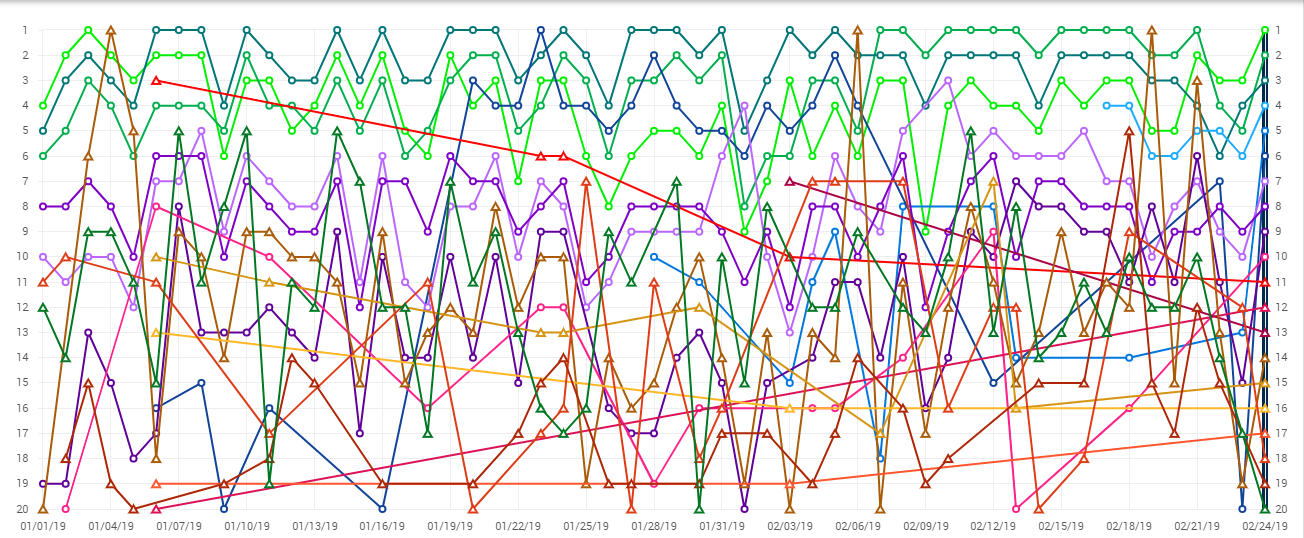
That's a screenshot of the top 20 for "exercise science degree".
While it looks messy, there is a ton of data to be found in this graph.
Inside SERPWoo, if I roll my mouse over today's date, I can find which websites are new to this SERP and which ones have "staying power" or longevity. Those with staying power are the URLs I want to take a closer look at and figure out what they might be doing well at.
Rolling over the 4th position for today ( 2-24-2019 ), I find isaaonline.edu. This is such a new site, I want to exclude it from any ranking analysis as it only started ranking on 2-17-2019.
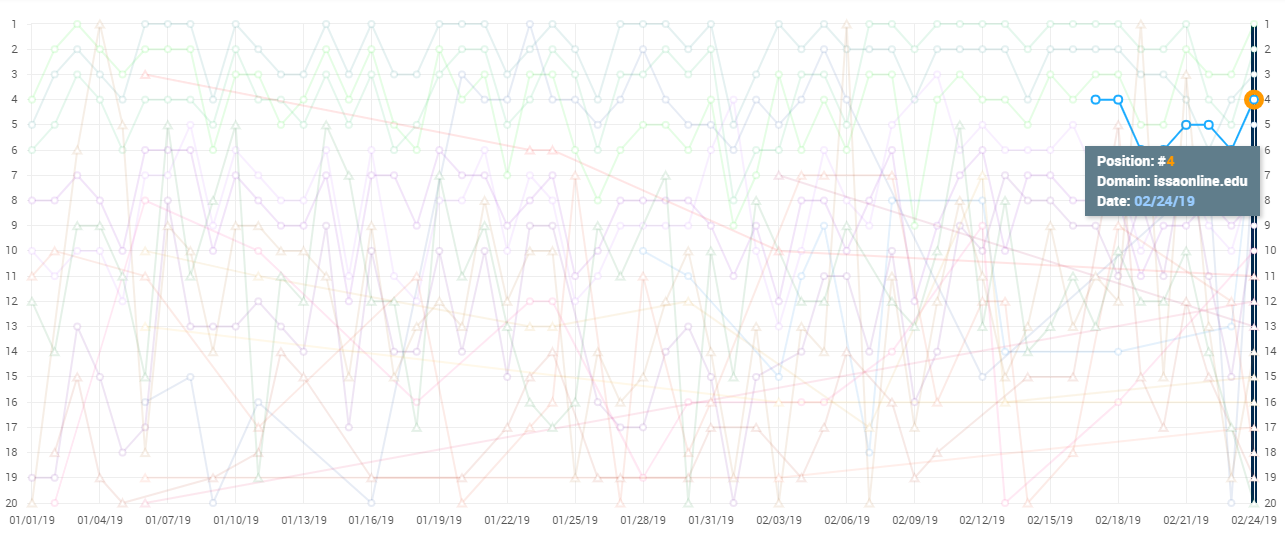
Same thing for calu.edu. It popped into the SERPs for this keyword around 1-28-2019 but is currently ranked 5th today.
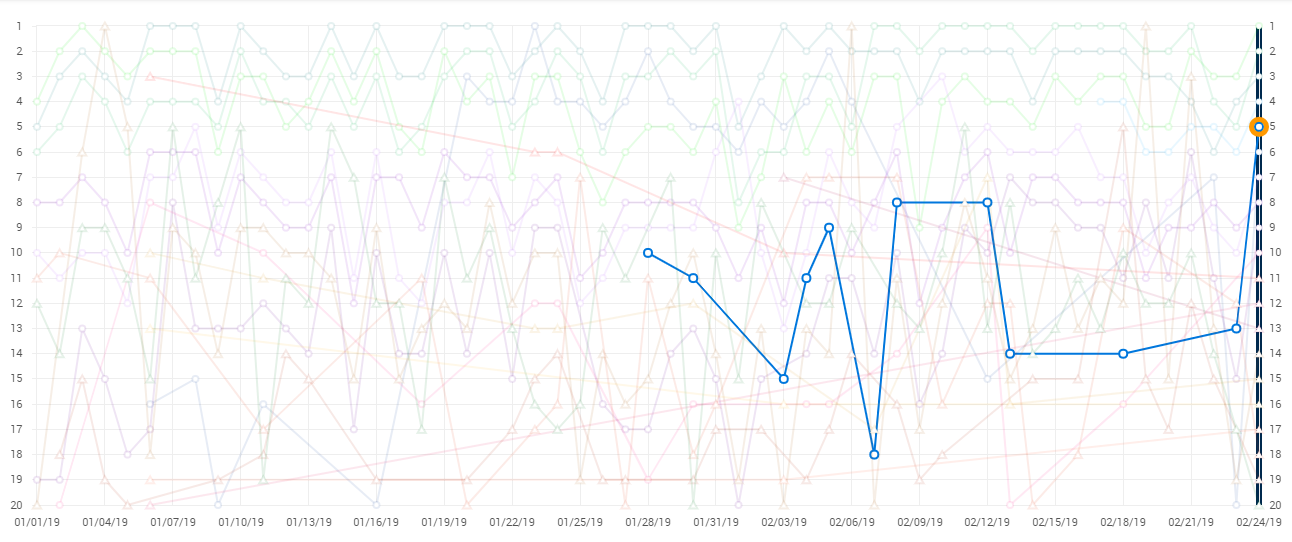
Continuing this task, I end up with a good set of targets I can research for my SEO analysis of who my true ranking competitors are.
If I remove non-academic organizations like aggregators and affiliates from this list as well, I end up with a competitor like csp.edu who has an excellent SERP profile for this keyword and ranks 7th as of this writing.
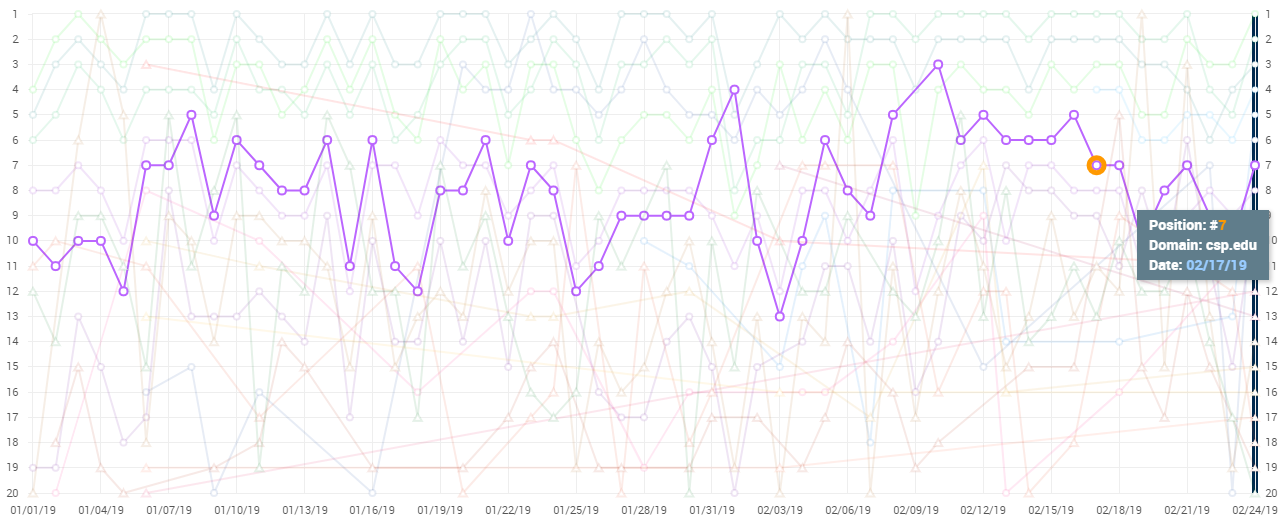
Research into your competitors isn't about who are the sites that are top 3, but about who has longevity in your target SERP.
Once you learn what they are doing, you can match and exceed their efforts to rank above them.
If you try to match and exceed a new site in the SERPs and copy what they have done, what happens when they fall out of the SERPs a few days later? Yeah, you will more than likely go down with them.
Try to research those who have staying power in your SERPs, not the ones that are a new "flash in the pan".
Our original messy exercise science degree graph also tells me there is a lot of volatility in that particular SERP. This gives me a clue to either stay out of that SERP ( because I might never hold a decent ranking because of many factors ) or try to rank but let my client or upper management know ahead of time this is a very difficult SERP to stay ranked in.
That helps keep expectations in check.
We even offer a volatility score within SERPWoo. Here is that score for the keyword "exercise science degree."

The higher the number, the more volatile the SERP is.
Anything below a 30 is excellent low hanging fruit for me. That tells me there isn't a lot of shuffling going on within the rankings day by day.
Here is a volatility score I like to see for myself:

Maybe that's because there are not a lot of competitors, or the SERP isn't experiencing manual penalties, etc. No matter what, if I can rank in it, then I can keep that ranking over the long term if the score is below 30.
Exercise Science Degree as a keyword is pretty volatile, let's look at the graph again and then compare it to a less volatile keyword like Child Psychology Degree.
Exercise Science Degree
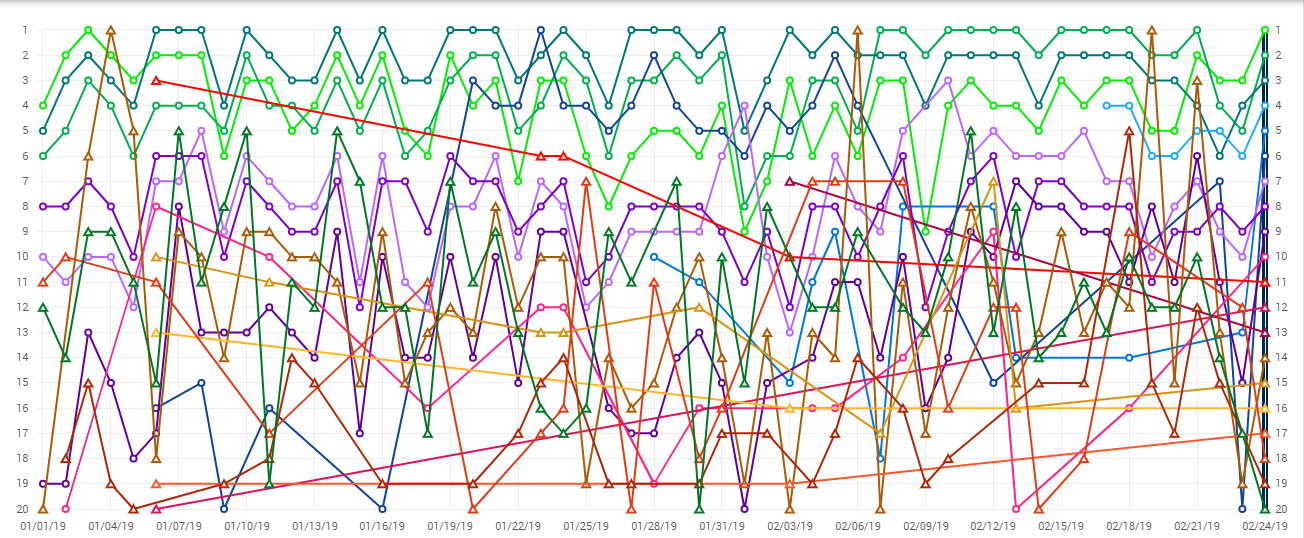
Child Psychology Degree
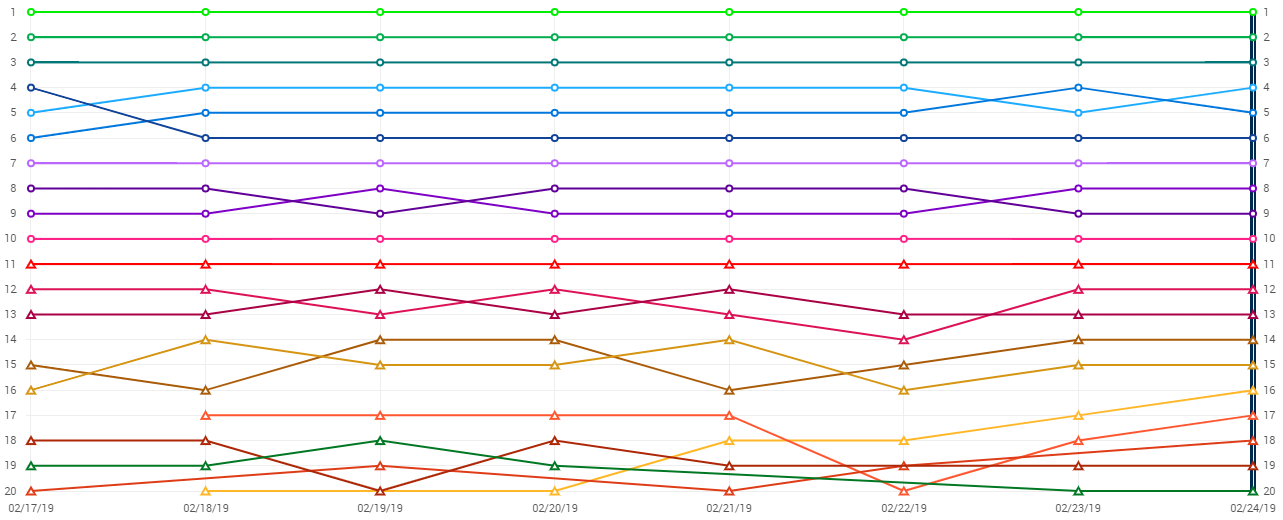
While Child Psychology Degree might be a less popular keyword, this is representative of a SERP that is less volatile.
Not much action or variation.
If you can rank in this SERP, you can depend on this traffic for months at a time. And that is great for growing your leads, applications, enrollments, and starts over time.
The beautiful thing is, you can do this research ahead of time by tracking your desired keywords with SERPWoo before you start building out pages on your website.
If you were to pull in 100 variations of your target keyword, you could track who are the real competitors for that program across all 100 SERPs, and then also determine which ones might be the easiest to rank for based on volatility.
Over time, you could work on the harder variations, but at least you would have the data before you build. This could cut down on a lot of headaches, meetings with upper management, and potential issues when lead numbers go down in the future because of a volatile SERP ranking.
And how do you come up with 100 variations of your keyword?
Well, I'll give you a headstart below. Copy the list below and then do a "find and replace" on the XXXXX sections with the desired degree keyword.
Then replace Bachelors with the degree level and Arts with the degree type. Be sure also to replace Ba with the appropriate designation too.
- Ba Degree In XXXXX
- Ba Degree In XXXXX Online
- Ba In XXXXX
- Ba In XXXXX Degree
- Ba In XXXXX Degree Online
- Ba In XXXXX Online
- Bachelor Degree In XXXXX
- Bachelor Degree In XXXXX Online
- Bachelor In XXXXX
- Bachelor In XXXXX Degree
- Bachelor In XXXXX Degree Online
- Bachelor In XXXXX Online
- Bachelor Of Arts Degree XXXXX
- Bachelor Of Arts Degree XXXXX Online
- Bachelor Of Arts Degree In XXXXX
- Bachelor Of Arts Degree In XXXXX Online
- Bachelor Of Arts XXXXX
- Bachelor Of Arts XXXXX Degree
- Bachelor Of Arts XXXXX Degree Online
- Bachelor Of Arts XXXXX Online
- Bachelor Of Arts In XXXXX
- Bachelor Of Arts In XXXXX Degree
- Bachelor Of Arts In XXXXX Degree Online
- Bachelor Of Arts In XXXXX Online
- Bachelors Degree In XXXXX
- Bachelors Degree In XXXXX Online
- Bachelors In XXXXX
- Bachelors In XXXXX Degree
- Bachelors In XXXXX Degree Online
- Bachelors In XXXXX Online
- Bachelors Of Arts Degree XXXXX
- Bachelors Of Arts Degree XXXXX Online
- Bachelors Of Arts Degree In XXXXX
- Bachelors Of Arts Degree In XXXXX Online
- Bachelors Of Arts XXXXX
- Bachelors Of Arts XXXXX Degree
- Bachelors Of Arts XXXXX Degree Online
- Bachelors Of Arts XXXXX Online
- Bachelors Of Arts In XXXXX
- Bachelors Of Arts In XXXXX Degree
- Bachelors Of Arts In XXXXX Degree Online
- Bachelors Of Arts In XXXXX Online
- Degree XXXXX
- Degree XXXXX Online
- Degree In XXXXX
- Degree In XXXXX Online
- Degrees XXXXX
- Degrees XXXXX Online
- Degrees In XXXXX
- Degrees In XXXXX Online
- XXXXX Ba
- XXXXX Ba Degree
- XXXXX Ba Degree Online
- XXXXX Ba Online
- XXXXX Bachelor
- XXXXX Bachelor Degree
- XXXXX Bachelor Degree Online
- XXXXX Bachelor Of Arts
- XXXXX Bachelor Of Arts Degree
- XXXXX Bachelor Of Arts Degree Online
- XXXXX Bachelor Of Arts Online
- XXXXX Bachelor Online
- XXXXX Bachelors
- XXXXX Bachelors Degree
- XXXXX Bachelors Degree Online
- XXXXX Bachelors Online
- XXXXX College
- XXXXX College Online
- XXXXX Colleges
- XXXXX Colleges Online
- XXXXX Degree
- XXXXX Degree Online
- XXXXX Degrees
- XXXXX Degrees Online
- XXXXX Program
- XXXXX Program Online
- XXXXX Programs
- XXXXX Programs Online
- XXXXX School
- XXXXX School Online
- XXXXX Schools
- XXXXX Schools Online
- XXXXX Universities
- XXXXX Universities Online
- XXXXX University
- XXXXX University Online
- Online Ba Degree In XXXXX
- Online Ba In XXXXX
- Online Ba In XXXXX Degree
- Online Bachelor Degree In XXXXX
- Online Bachelor In XXXXX
- Online Bachelor In XXXXX Degree
- Online Bachelor Of Arts Degree XXXXX
- Online Bachelor Of Arts Degree In XXXXX
- Online Bachelor Of Arts XXXXX
- Online Bachelor Of Arts XXXXX Degree
- Online Bachelor Of Arts In XXXXX
- Online Bachelor Of Arts In XXXXX Degree
- Online Bachelors Degree In XXXXX
- Online Bachelors In XXXXX
- Online Bachelors In XXXXX Degree
- Online Bachelors Of Arts Degree XXXXX
- Online Bachelors Of Arts Degree In XXXXX
- Online Bachelors Of Arts XXXXX
- Online Bachelors Of Arts XXXXX Degree
- Online Bachelors Of Arts In XXXXX
- Online Bachelors Of Arts In XXXXX Degree
- Online Degree XXXXX
- Online Degree In XXXXX
- Online Degrees XXXXX
- Online Degrees In XXXXX
- Online XXXXX Ba
- Online XXXXX Ba Degree
- Online XXXXX Bachelor
- Online XXXXX Bachelor Degree
- Online XXXXX Bachelor Of Arts
- Online XXXXX Bachelor Of Arts Degree
- Online XXXXX Bachelors
- Online XXXXX Bachelors Degree
- Online XXXXX College
- Online XXXXX Colleges
- Online XXXXX Degree
- Online XXXXX Degrees
- Online XXXXX Program
- Online XXXXX Programs
- Online XXXXX School
- Online XXXXX Schools
- Online XXXXX Universities
- Online XXXXX University
These keywords should get you started down the path to monitoring SERPs in SERPWoo and finding out true competitors and which keywords to tackle first.
Something else we have found in our research is that most top 3 rankings are hard to break.
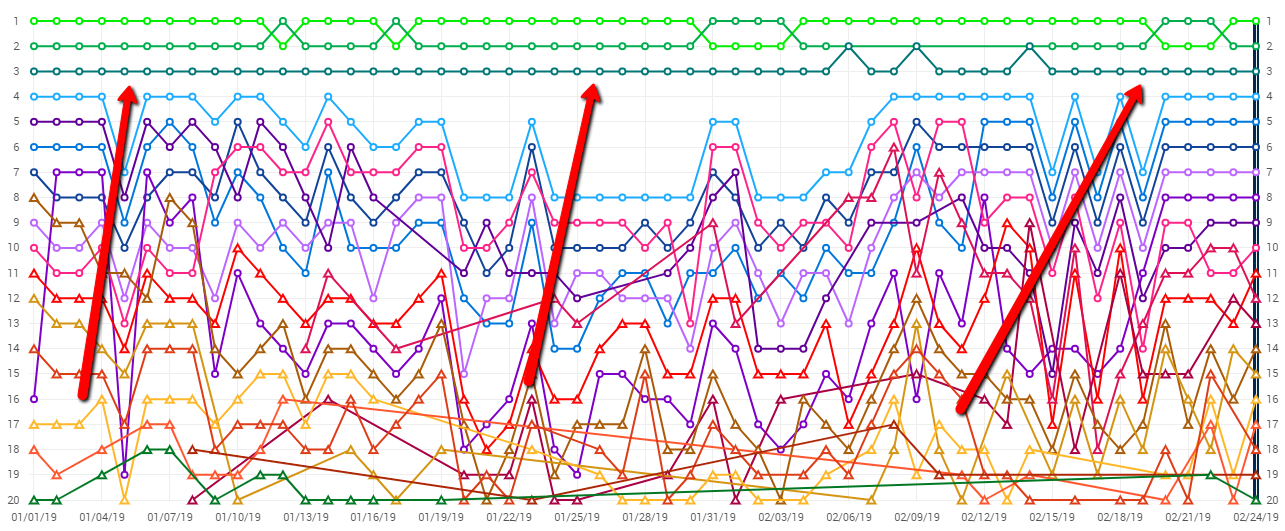
In this screenshot from inside SERPWoo, you can see that the top 3 websites for this keyword don't bounce around a lot.
It's pretty stable and steady with some minor back and forth within the top 3 when it comes to rankings.
But notice every ranking that is 4th and below has tons of movement and volatility.
With Google already pushing down organic rankings in the SERPs with ads and other features, obtaining top 3 positions is more important than ever.

Bottom line, if your SEO plan isn't good enough to target top 3 rankings, why bother? Anything less will more than likely not stick, and you will never be able to forecast your metrics properly.
And it's not about getting a "sticky" position and ranking, but also about potential students finding your listing in general.
I have to scroll for a while on my desktop to find the first organic listing for a keyword like "architecture schools near me", which is way below the fold on my screen.
Can you imagine what this looks like on mobile?

If you are not putting in serious time and dollars for ranking top 3 for your keywords, you should rethink your strategy because, in all likelihood, you won't be able to count on the traffic or leads in the near future as organic gets pushed down in favor of other SERP features.
Having this type of SERP data is critical to anyone looking to build a comprehensive SEO strategy in today's time.
That's why I built SERPWoo. That's why our competitors are copying our innovations left and right. Far too long most digital marketers were planning their strategies in the dark without tools that helped show them what was going on in their specific SERPs.
Knowing the right competitors to research and knowing which keywords to rank for ahead of time became a foundation of a good SEO strategy for me and many others that use SERPWoo today.
And in a super competitive industry like higher education, it should be the foundation of your strategy too.
Most of us higher education folks know that most of the enrollments for our schools come within a wide 80-mile radius of the location of the school.
While there might be outliers, local presence is a huge factor for both ground and online programs when a student picks a school.
But have you checked if your school even ranks for programs in the given locality it is in?
Meaning, if you offer an MBA and your school is located in Chicago… does your school rank for that term to those searching in Chicago? If not, you could be missing all those local students that should be finding you.
No worries, SERPWoo can help you here as well. Checking local SERPs is made easy with our new tool at https://www.serpwoo.com/lab/check-local-search-results/ .
By inputting the locality you wish to see, along with the term you want to check, we can show you what the SERPs look like in that geography so you can see what students see when they search.
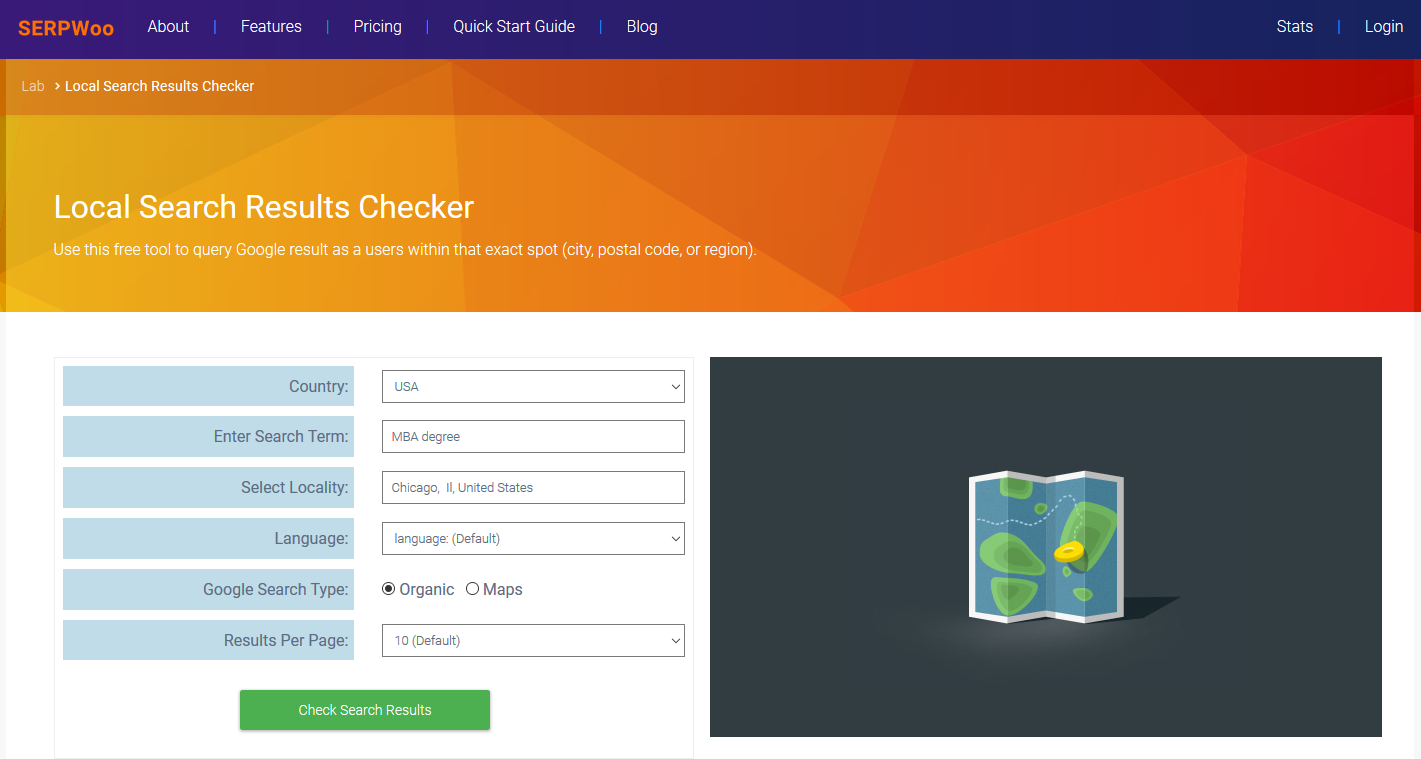
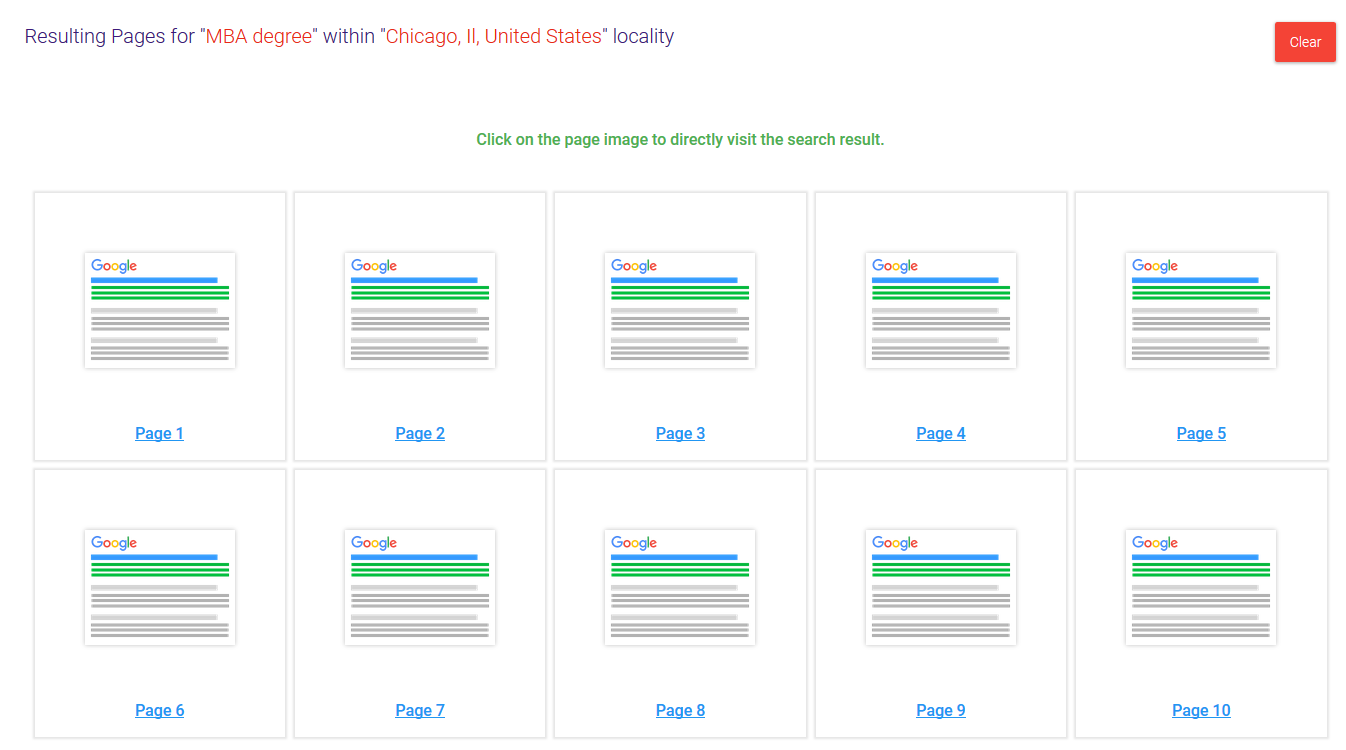
And here is the bottom of the page 1 results for that MBA degree term focusing on Chicago to prove that the results are from that location.
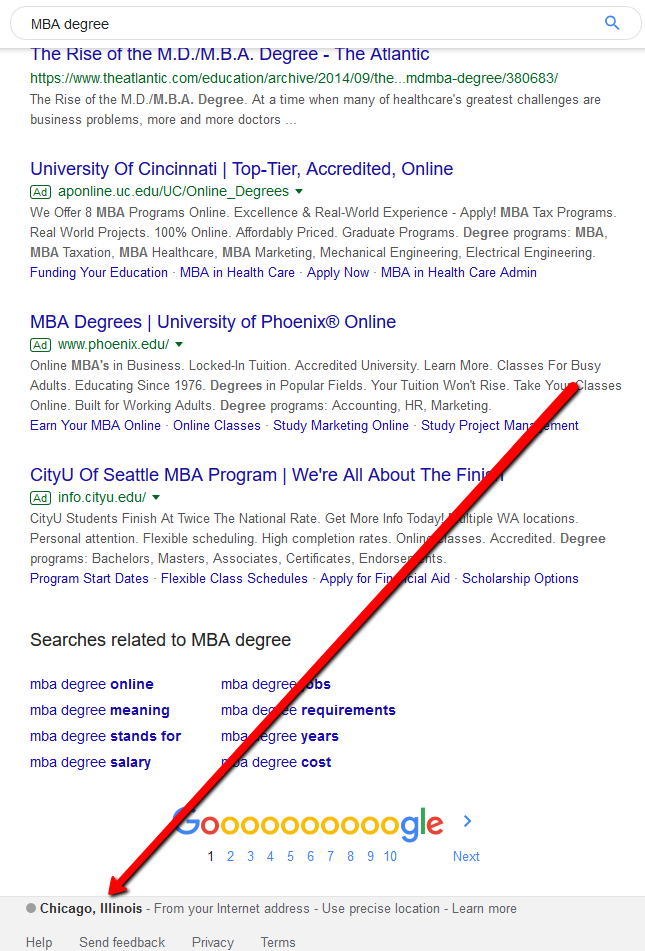
See how easy that is?
For schools with multiple locations, this tool can help save you tons of time in checking what prospective students see when they search for degree programs in their locality.
Researching the SERPs day by day is one of the best ways to get ahead of your competitors because most of them aren't doing exercises like this.
Most of them don't have the tools to perform such tasks.
Most of them will not find the pockets of opportunity to capture ranks on alternative keywords.
And most of them will waste time guessing on how to rank with outdated "guru" information while you have up to date, real-time ranking data to act on.
Summary:
Watching the SERPs provides an instant and concrete method for knowing how to rank within your specific keywords.
Doing so provides you with actionable data as long as you remove outliers and view the SERPs over time to determine true competitors and ranking difficulty.
SERPWoo invented SERP Tracking, which replaced broken SEO methods like rank tracking, to help dig into data and reveal insights for getting more traffic from Google.
Conclusion of Higher Education SEO
We wanted to dig into the higher education vertical to see what it was taking to rank in 2019 based on data no one else was providing in the digital marketing industry.
Myself, I got tired of seeing the same old cookie-cutter 400-word articles from the "big names" that tell me the top keywords searched on Bing this week. Or a 3 step guide to SEO for beginners that blanket covers general topics like how to get your site indexed by Google.
Who needs that garbage?
Most of those articles are written by 3rd parties who have never ranked a website in their lives.
Are these the people you want to follow and depend on for advice with your SEO strategy?
So we decided to step up and at least start the process of digging into data that people want to really see. Like how to get ranked in Google with actionable data that isn't sugar-coated with generic advice from people who barely know what a meta-tag is.
And while we know we still have lots to dig into and test; we wanted to get the ball rolling now and update as we find more data in a few months.
Generic advice isn't going to help you. Each SERP is its own entity. You need to know how your SERP lives and breathes.
It's not enough to know the basics like:
- More content = better rankings
- More links = better rankings
You need to dig in and see how things like lead forms help with rankings, or that links with brand anchors are helping targeted keyword rankings more than using the keyword you want to rank for.
Findings that show relevant links count more than high authority links is also a game changer.
You shouldn't be letting your SEO team build any kind of links they can find because some guru or tool made up some metric that many inexperienced SEO's follow blindly.
You also have to dig into the data and understand that if you are not being serious about ranking in the top 3, you pretty much need to throw in the towel and give up. Doing this half-assed isn't going to cut it in today's SEO game.
You are going to need top of the line, A+ experienced, niche marketers who rely on ranking data to be executing on an SEO plan that was developed with real-life expectations of how your target terms perform in the SERPs today.
Anything less is throwing money out of the window and setting your school up for failure down the road at the next algorithm update.
And doing this frequently is the key to winning in the SERPs. Things will change in the next 90 or 180 days. Are you going to put in the work to find the new changes, or will your SEO team still be executing on old data that is no longer relevant?
Using tools like SERPWoo can help you dig into the data that matters today without giving you outdated data like our competitors who might only update every month or every quarter.
Shameless Plug
So here's a serious question.
Are you a school or higher education marketing agency looking for help with your digital strategy in 2019?
I'm currently looking to partner with a few select higher education clients that could benefit from my prior experience in helping over 50 schools reduce their marketing costs, improve their enrollments, and drive growth for their ground and online programs.
If interested, shoot me an email to see if we're a match today.
Oh, and if you want to get more detailed reports like this, sign up for a paid SERPWoo account. We send out monthly exclusive guides like this to our paid members that include content found nowhere else online!
